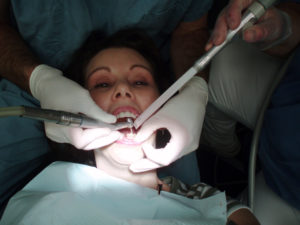 If you have red, swollen, irritated and bleeding gums, you may need treatment for gum disease (or periodontal disease). Gum disease can be categorized into types, namely gingivitis and periodontitis. Gingivitis causes mild to moderate inflammation in your gingiva or gums. It is the earliest stage of gum disease that can remedy with good oral hygiene. Without proper dental care, it can lead to a more serious condition called periodontitis that causes pocketing around the teeth, tooth loss and damaged jaw bones.
If you have red, swollen, irritated and bleeding gums, you may need treatment for gum disease (or periodontal disease). Gum disease can be categorized into types, namely gingivitis and periodontitis. Gingivitis causes mild to moderate inflammation in your gingiva or gums. It is the earliest stage of gum disease that can remedy with good oral hygiene. Without proper dental care, it can lead to a more serious condition called periodontitis that causes pocketing around the teeth, tooth loss and damaged jaw bones.
Untreated gum disease has also been associated with heart disease and stroke. However, if you practice good oral hygiene, which includes brushing, flossing, and getting timely dental checkups and cleanings, you can prevent gum disease from becoming any serious health conditions. So if you encounter any symptoms of gum disease, you should see your dentist immediately for an oral care examination.
Symptoms of Gingivitis
Gingivitis is seldom painful, you can have it without even knowing it. However, there are some visible and obvious symptoms of the disease. You may have gingivitis if:
- you have bleeding gums
- you have frequent mouth sores
- you have receding gums
- your gums feel tender to the touch
- your gums are swollen
- your gums appear shiny and irritated
- you have persistently bad breath
- it hurts during chewing
- you have loose or sensitive teeth
Causes of Gingivitis
Gingivitis mainly occurs due to poor dental care. When plaque, developed when mucus, bacteria, food particle stuck to your teeth combine together, is not removed, it hardens to form tartar that sticks to the base of your teeth. Plaque and tartar are major causes of gingivitis.
Injury to your gum due to overly harsh brushing and flossing can also lead to gingivitis. Other causes include tobacco use, hormonal changes in pregnant women, and poor treatment of diabetes. It is also caused by:
- poorly aligned teeth
- poorly fitted braces, dentures, or crowns
- certain medications like Dilantin (phenytoin) and birth control pills
Certain health conditions that destroy the immune system, such as cancer and HIV/AIDS, can also heighten your risk of gingivitis. Gum disease can also be hereditary in nature.
Diagnosing Gingivitis
Diagnosis of gingivitis involves a thorough examination of your medical history and your mouth. Using a probe, the dentist will examine the areas in your mouth, between the teeth and gum. If he finds any unusual gaps between your teeth and gum line, you might probably be treated for gingivitis. The diagnosis may also involve taking dental X-rays to check any loss of bone tissue
Gingivitis Treatments
Treatment of Gingivitis at Dentist Partner may involve a thorough cleaning of your teeth. The dentist might also prescribe medications to eliminate bacteria and inflammation. Besides, adopting good dental care practice at home will be necessary to avoid gingivitis from worsening into periodontitis, the treatment of which may involve surgery.
As we say that ‘prevention is better than cure,’ if you maintain good oral hygiene like brushing and flossing regularly, avoiding the use of tobacco, maintaining a balanced diet, and, of course, visiting your dentist regularly, will help prevent gingivitis and reinforce your dental health.
Author Bio:
Roman Beres is an expert writer and blogger with a strong passion for writing. He shares views and opinions on a range of topics such as Business, Health/Fitness, Lifestyle, Parenting and lot more. He works for Dental Clinic and helps you find the best flushing dentist, NY.
Picture Credit : Therese Branton











